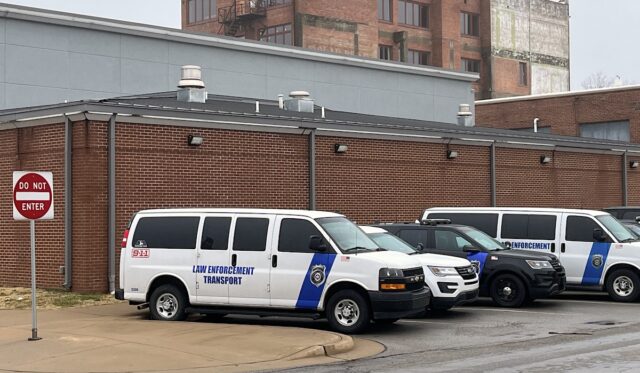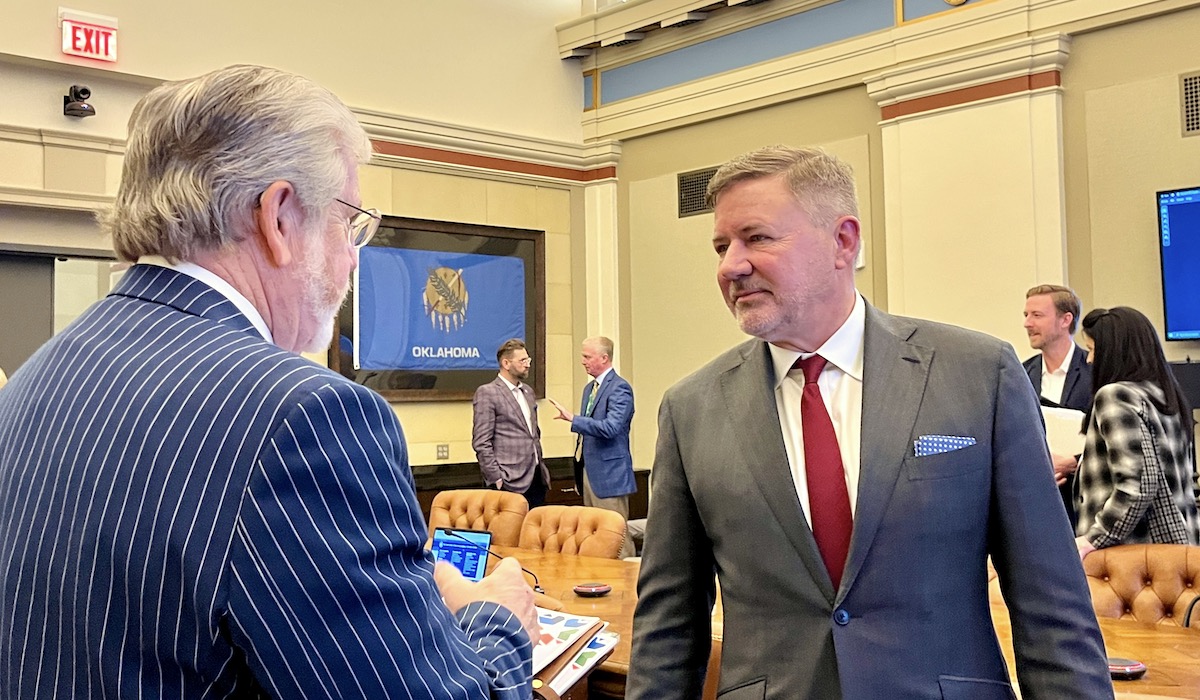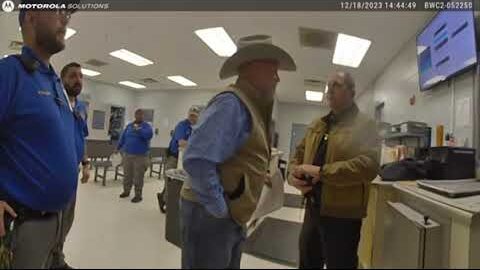

OKMULGEE — In the two months since the Muscogee (Creek) Nation charged Okmulgee County Jail detention officer Matthew Douglas with battery for a physical altercation regarding the custody of a man arrested for drug possession, the Grand River Dam Authority suspended its cross-deputization credentials for tribal police forces, Oklahoma Gov. Kevin Stitt ordered a new task force, and Principal Chief David Hill called the situation “dangerous” and a “political ploy.”
Before members of Stitt’s One Oklahoma Task Force could even be appointed, GRDA informed the Muscogee and Cherokee nations it was suspending the state commission cards it had issued tribal officers in 2020 after signing cross-deputization agreements.
The public power utility’s move aligned with the wishes of Stitt, who told reporters after a Dec. 22 meeting that the agreement granting state commissions to tribal officers was “something that the GRDA needs to take a look at.”
“If the GRDA has the ability to have a police department in 77 counties or wherever their high wires or their assets are, if you give a jurisdiction two ways, you have basically created a situation where you can allow the Creeks to have police authority in Woodward, Oklahoma. That’s not what Oklahomans envision,” Stitt said. “That’s not what Oklahomans want. So we need to relook at that.”
As it turns out, no one really knew the scope of GRDA’s statutory authority for law enforcement jurisdiction. In the aftermath of the Dec. 18 incident at the Okmulgee County Jail, state, tribal and local officials initially believed GRDA police — and their cross-commissioned tribal nation officers — had authority in 26 counties. Further review led GRDA to determine only 19 counties qualified.
While Woodward is not one of those counties like Stitt hypothesized, Oklahoma County is, meaning Cherokee marshals and Muscogee Lighthorse police held GRDA policing jurisdiction in Oklahoma City, even if no one realized it or utilized it.
That peculiarity ended on Jan. 5 when GRDA Chief of Law Enforcement Brian Edwards sent letters to leaders of the Cherokee Nation Marshal Service and the Muscogee Lighthorse Police Department. Edwards said the non-appropriated agency was withdrawing tribal officers’ state commission cards “to be consistent with the other agencies of the state of Oklahoma which have cross-deputization agreements with tribal police departments.”
Hill responded by saying GRDA’s decision stemmed from “Stitt’s desire to undermine tribal jurisdiction at the expense of the most vulnerable Oklahomans.”
Counties where GRDA has police jurisdiction:
Adair, Cherokee, Craig, Creek, Delaware, Lincoln, Mayes, Muskogee, Nowata, Oklahoma, Okmulgee, Osage, Ottawa, Pawnee, Payne, Rogers, Sequoyah, Tulsa and Wagoner.
“Our attorney general met with the Grand River Dam Authority officials on Dec. 22 (…) where they expressed enthusiastic support for the benefits of working together under our cross-deputization agreement. They even began planning training events to make others aware of how well it worked,” Hill said in a statement. “Since that time, the GRDA has moved to suspend this agreement pending the outcome of Gov. Stitt’s planned task force. Given the absence of any substantive issues related to the GRDA Commission, we are left to conclude that the suspension of this agreement results from pressure from Gov. Stitt and his campaign to undermine the sovereignty of tribes and deteriorate public safety.”
Days later, Hill and other leaders of the Five Tribes announced they would not participate in Stitt’s task force.
“When we have a willing partner at the state of Oklahoma, we are fully prepared to move forward. We are eager to work with our friends and neighbors to improve coordination in public safety efforts,” Hill and his peers wrote in a letter. “What we cannot do is participate in an effort that spreads falsehoods about the law, attempts to minimize tribal voices, and engages in political attacks instead of constructive government-to-government dialogue.”
At its Jan. 10 meeting, the board of the Grand River Dam Authority discussed its cross-deputization agreements during a closed executive session, and no action was taken. Asked about the revocation of commissions for tribal officers, GRDA President and CEO Dan Sullivan — himself a commissioned police officer for his agency — referenced the letters sent to Cherokee and Muscogee leaders.
“We think we’ve covered it with the statement we issued,” Sullivan said.
Drummond: Muscogee Nation lacked jurisdiction to charge Matthew Douglas
December’s Okmulgee County Jail brouhaha epitomized deeper difficulties in a state politically at odds with itself over how to adapt its criminal justice systems following the U.S. Supreme Court’s 2020 ruling in McGirt v. Oklahoma. With their reservations affirmed — at least for purposes of the Major Crimes Act — tribal nations in eastern Oklahoma have added police officers, prosecutors and judges. New jails have been discussed as well.
Because only tribal governments and the federal government have jurisdiction to prosecute tribal citizens within the bounds of Indian Country reservations, Oklahoma’s three federal court districts have also become far busier.
Judges from around the country have earned overtime handling extra dockets in Oklahoma, and the state has suddenly offered an entry point for young attorneys eager to become federal prosecutors. State district attorneys acknowledge that their tribal and federal counterparts can typically pay better wages, and they worry about a brain drain in state courts. Although a spokesman for the U.S. Attorney’s Office in Muskogee would not confirm a rumor last year that at least 100 new prosecutors were being hired for the Eastern District Court — historically a sleepy bar with only a pair of judicial seats — he did not deny it, either.
Early Thursday in the U.S. District Court for the Eastern District of Oklahoma, state Attorney General Gentner Drummond filed a writ of habeas corpus seeking dismissal of the protected-status battery charge jailer Matthew Douglas faces in Muscogee Nation District Court.
Drummond’s petition argued that 25 U.S.C. Section 1304 explicitly limits the Muscogee Nation’s ability to charge individuals with “assault of a tribal justice personnel” to circumstances where the officer is working a “covered crime” listed in the statute. Covered crimes are defined as assault on tribal justice personnel, child violence, dating violence, domestic violence, obstruction of justice, sexual violence, sex trafficking, stalking, and violation of a protective order.
As argued by Drummond, the Muscogee Nation Lighthorse officers were not working a “covered crime” on Dec. 18 when they attempted to book a man for drug-related charges. As a result, Drummond argues, the federal law did not authorize the Muscogee Nation to exercise criminal jurisdiction over Douglas, a non-Indian.
“Congress does not include (1) narcotics charges or (2) violation of any state laws as ‘covered crimes,’” Drummond’s petition states. “Accordingly, the MCN does not have jurisdiction to charge petitioner with a violation of tribal law for his conduct on Dec. 18, 2023, as any alleged ‘assault of tribal justice personnel’ must have been ‘during, or because of, the performance or duties’ of that officer in ‘detaining … persons charged with a covered crime’ or ‘incarcerating … persons convicted of a covered crime.’”
If Drummond’s petition is successful, the federal court would find that the Muscogee Nation lacks jurisdiction to prosecute Douglas in this case. Such a ruling would also establish precedent that tribes lack the authority to prosecute non-Indians who assault or batter tribal officers working drug crimes or similar situations. Tribes would have to request that such charges be filed by either state or federal prosecutors.
Jason Salsman, press secretary for the Muscogee Nation, issued a statement Thursday about Drummond’s filing.
“Muscogee (Creek) Nation is aware that Attorney General Drummond’s office has filed a federal lawsuit challenging the authority of the nation to file criminal charges in its own court and under its own laws against a non-Indian defendant for acts occurring within the Muscogee Reservation, even though Congress has already affirmed the authority of tribal nations to exercise this authority in certain situations,” Salsman said. “The nation has yet to be served with the petition, but the nation will respond appropriately when the time comes. It is unfortunate that AG Drummond will spend the State’s resources challenging the authority of the nation to prosecute crimes in its own Reservation when that defendant has his own attorney and is free to make those challenges for himself in court.”
Douglas is due in Muscogee Nation District Court on March 27 for an arraignment that was delayed in December and again in January. Under Muscogee Nation Code, punishment for a felony battery conviction would include a fine between $1,000 and $5,000 and between 30 days and one year in prison. However, Title 14‘s felony sentencing guidelines specifies the punishment for an “Indian person,” which Douglas is not.
Instead, Douglas is the first non-native charged in the Muscogee Nation under the “protected status battery” offense authorized by Congress in 2022. Douglas was charged after he became physically combative with Muscogee Lighthorse Deputy Chief Dennis Northcross, who had stepped through a closing door and into the Okmulgee County Jail’s booking area, a violation of facility protocols and — jailers said — state law.
Captured by body camera footage from Lighthorse Officer Aaron Torix, the struggle between Northcross and Douglas drew the presence of other jail staff and Lighthorse officers. As parties separated, Lighthorse Officer Keith Bell told Douglas he would be arrested for putting hands on Northcross.
All the while, Terry Ivers Jr. — the man whose arrest and booking into the Okmulgee County Jail caused the fracas in the first place — was handcuffed to a bench in the pre-booking area.
“What is going on?” Ivers cried. “Oh my god, this is all because of me? I’m so sorry.”
‘I should have stayed home’
If Terry Ivers Jr. had understood the legal particulars of the state criminal code for drug possession, none of this would have happened.
Instead, he hid a circular jar of fentanyl under his 25-inch hernia for an hour and irritated Muscogee Lighthorse officers into arresting him more for lying about drugs than for being on drugs.
Of course, Ivers’ peculiar presentation on Dec. 18 stemmed from a few factors, many of which he consistently explained during the two hours of his search, arrest and detention, which was recorded in MCN Lighthorse body camera footage released by the tribe and GRDA.
In an interview following his arrest, Ivers — whose juggalo nickname is PikNik — said he delivers food for DoorDash to earn extra cigarette money for himself and his father. Ivers is on Social Security Disability Insurance after a 20-year career selling cars for David Stanley Dodge. After an appendicitis erupted, Ivers nearly died. A hernia ruptured during surgery, and he now typically wears a brace to support the abdominal protrusion, but he was not wearing it when Lighthorse officers encountered him Dec. 18 stopped in the middle of the street near their dispatch office and an Okmulgee school.
Ivers’ sister works as a dispatcher for the Lighthorse Department, and he told officers he had a weird feeling about his car, which he claimed his father told him to take to his sister so she could see what was wrong with it.
As officers searched the vehicle and found a pipe and cut straws that they believed were for methamphetamine use, Ivers claimed a woman who had borrowed his car to pick him up from a Tulsa hospital the night before had put the items there. Ivers repeatedly said he had been hospitalized for a diabetic coma and was late for another medical appointment regarding his hernia and to determine whether he had suffered a stroke owing to spikes in his blood sugar, which ultimately registered above 400 when a jail nurse checked it following the fight between police and detention officers.
But during their traffic stop, Lighthorse officers expressed skepticism about Ivers’ health claims. At one point, Ivers’ sister was summoned from the Lighthorse building, but she told officers she did not want to interact with him owing to a dispute with their father and other issues.
Officers kept asking Ivers to produce methamphetamine, which he said he did not have. They noted he had become agitated and hyper, but Ivers tried to explain that away as well.
“I’m bipolar, it’s just my emotions. I should have stayed home,” Ivers said. “I need water really bad.”
Both Lighthorse officers repeatedly tried to tell Ivers that possession of drugs and paraphernalia are only misdemeanor offenses under Oklahoma law because voters approved State Question 780 in 2016.
“Listen to me. I am this close to taking you to the jail, OK? Because I believe you have narcotics on you, OK? And it’s going to be a felony when you get in there, OK?” Bell told Ivers. “If you have something on you right now, you need to give it to me right now. (…) Cause what could be a misdemeanor right here is going to be a felony if you get in that jail.”
Ivers didn’t comply, even as officers let him call his father — Terry Ivers Sr. — to come pick up the car. About 57 minutes into Bell’s body camera footage of the traffic stop, the officers noticed a small pill container fall from Ivers’ body.
“That’s mine. That’s mine. That’s the only thing I knew about,” Ivers suddenly stammered. “[The woman who drove my car] told me to hold that until this morning.”
Torix responded: “Did she also stick it under your nutsack and your butt for you?”
Ivers claimed it was in his pocket. As officers looked at the small white item in the container, Ivers told them it was fentanyl, a revelation that irritated officers further and cemented his destiny of detention.
Moments later, Muscogee dispatchers told Bell and Torix that the Okmulgee Police Department said their officers were busy with another call and would not be arriving to deal with Ivers, who is not a tribal citizen.
While the Muscogee Nation’s Lighthorse officers have active cross-commission agreements with several other cities and counties, long-standing tensions exist between the tribal police department and Okmulgee police and Okmulgee County leaders.
Underscoring the seriousness of the asymbiotic situation, Okmulgee is the capital of the Muscogee (Creek) Nation, but no law enforcement agreements are in effect between local and tribal police, even in a post-McGirt world. The Muscogee Nation does not even have a detention agreement with the Okmulgee County Jail, instead transporting tribal detainees arrested in Okmulgee to other county jails with which agreements do exist.
“We’re probably about to use this GRDA commission,” Bell said as Ivers was arrested.
Torix agreed.
“That’s what I was about to say. Dennis said push it, let’s push it,” Torix said.
Bell radioed to dispatch: “So I guess I’m going to execute this GRDA commission and try to walk him into the jail.”
Ivers said in a Dec. 26 interview that “it was a fight immediately” when Lighthorse officers took him into the jail pre-booking area and that he was “scared to death” of the Okmulgee County detention officers who ultimately booked him into custody.
Following the scuffle, representatives of both agencies made phone calls and discussed what had happened, as well as the rules about Bell’s and Torix’s GRDA state commission cards. As they waited for more than 20 minutes, Bell and Torix stood to the side and whispered to one another about the dynamics of the absurd situation.
“I’m about to call the state Attorney General’s Office,” Bell told his fellow officer.
Eventually, Okmulgee County Criminal Justice Authority director Shannon Clark re-emerged from his office and told Lighthorse officers that he had spoken with Okmulgee County District Attorney Carol Iski.
“Carol said don’t even accept the prisoner,” Clark told the officers. “She said the chances of prosecution are slim to none, so she’ll turn him loose. So just take him and — ”
Torix interjected: “Put the fentanyl right back out on the street, eh? What a fucking joke. I live in McIntosh County, too, so I’ll vote against her.”
Clark said it was Iski’s “authority to prosecute it.”
“So she said we as law enforcement people don’t need to be having these (arguments),” Clark said.
Torix replied: “I 100 percent agree.”
Ultimately, however, Ivers was booked into the jail. And contrary to Clark’s prediction, Iski did charge Ivers in Okmulgee County District Court with possession of a controlled dangerous substance and possession of drug paraphernalia, crimes that Oklahoma voters downgraded to mandatory misdemeanors in 2016.
His next set court date is set for April 5. In the meantime, Terry Ivers Sr. filed and received an emergency protective order against his son Jan. 25 after he alleged that Ivers. Jr. had stolen money from him.
“Terry Ivers Jr. verbally assaulted me when I told him I was going to file with Okmulgee PD for theft of money,” the father wrote. “He has threatened to hit me in the past. He is currently on fentyol (sic) and has court for it in Okmulgee County. He has left me with no bills paid and my water is turned off.”
According to court documents, Ivers Jr.’s sister — who works for Muscogee Lighthorse — referred the case to Adult Protective Services with the Oklahoma Department of Human Services. According to state prison records, Terry Ivers Sr. has been incarcerated multiple times for drug distribution crimes. He remains on probation through April.
Follow @NonDocMedia on:
Facebook | X | Text or Email
Drummond: ‘I will be at the table’

Under the terms of Stitt’s One Oklahoma Task Force, Drummond has authority to appoint one of the 13 members. On Jan. 18, he said he is his own appointee. Asked if tribal leaders’ decision not to participate in the task force affects its ability to spur substantive discussions and improve state-tribal cooperation, Drummond said that is yet to be determined.
“I think that’s really at the governor’s discretion, whether he did this for a political reason or if he wants it to be substantive, that’s his call,” Drummond said. “I can’t advocate for reconciliation with the tribes if I’m not at the table, so that’s why I will be at the table.”
RELATED
‘Sad state of affairs’: After altercation, Muscogee Nation charges Okmulgee County jailer by Tres Savage
Also at the table will be Jack Thorpe — the state district attorney for Adair, Cherokee, Sequoyah and Wagoner counties — who was chosen to represent the Oklahoma District Attorneys Council.
“My number-one issue is always going to be taking care of victims,” Thorp said. “We have been existing in the system post-McGirt, post-Castro-Huerta now for a little bit, and we’ve tried to work through most of the issues, but there’s still shortcomings in the state. I want to do what I can to [make sure that] it doesn’t depend on who the actor was that committed the crime, but that the victims see an appropriate punishment and are getting the services from the government that they deserve.”
Thorp said “the fix is always going to have to be a federal fix,” but he acknowledged that it is unlikely Congress will take action.
“I recognize that this is the system in Oklahoma that we’re going to operate with now and in the future,” Thorp said. “And so however best that we can work together as partners between the states, the cities, the counties and the tribes in order to better serve our victims — I mean, that’s what I’m hopeful about.”
In a Jan. 8 statement explaining his decision not to participate in Stitt’s task force, Hill called the McGirt decision “a pro-public safety ruling.”
Task force update
The One Oklahoma Task Force had its initial meeting Jan. 29. Its February meeting was cancelled, and its next meeting is set for March 11.
“As a matter of principle, the Muscogee (Creek) Nation welcomes any opportunity for collaboration to improve the public safety for all Oklahomans,” Hill said. “Unfortunately, the governor’s task force on McGirt is based on a false premise and seeks misguided political objectives through a structure intended to divide rather than unify. This task force cannot adequately serve the public good unless these flaws are corrected. We cannot participate in any endeavor aimed at weakening tribal nations and, by extension, harming public safety.”
Thorp, on the other hand, said he believed there was value in having discussions with all parties present.
“I have a very good relationship with the Cherokee Nation. I’d like to think I’ve got a pretty good relationship with Muskogee Creek Nation — District 27 encompasses both,” Thorp said. “And even though they have elected not to participate in this, it would still be my intent to speak with them and tell them the things that are going on within this commission (…) and try to work through the different problems that we have.”
While Okmulgee Police Chief Joe Prentice has not been appointed to governor’s task force stemming from the jail dust up, he does serve on the Oklahoma State Bureau of Investigation Commission.
Asked to discuss the Dec. 18 incident, Prentice said “it should have never happened” but stopped at that.
“This is a politically charged subject, and so I really don’t want to comment,” he said.





















